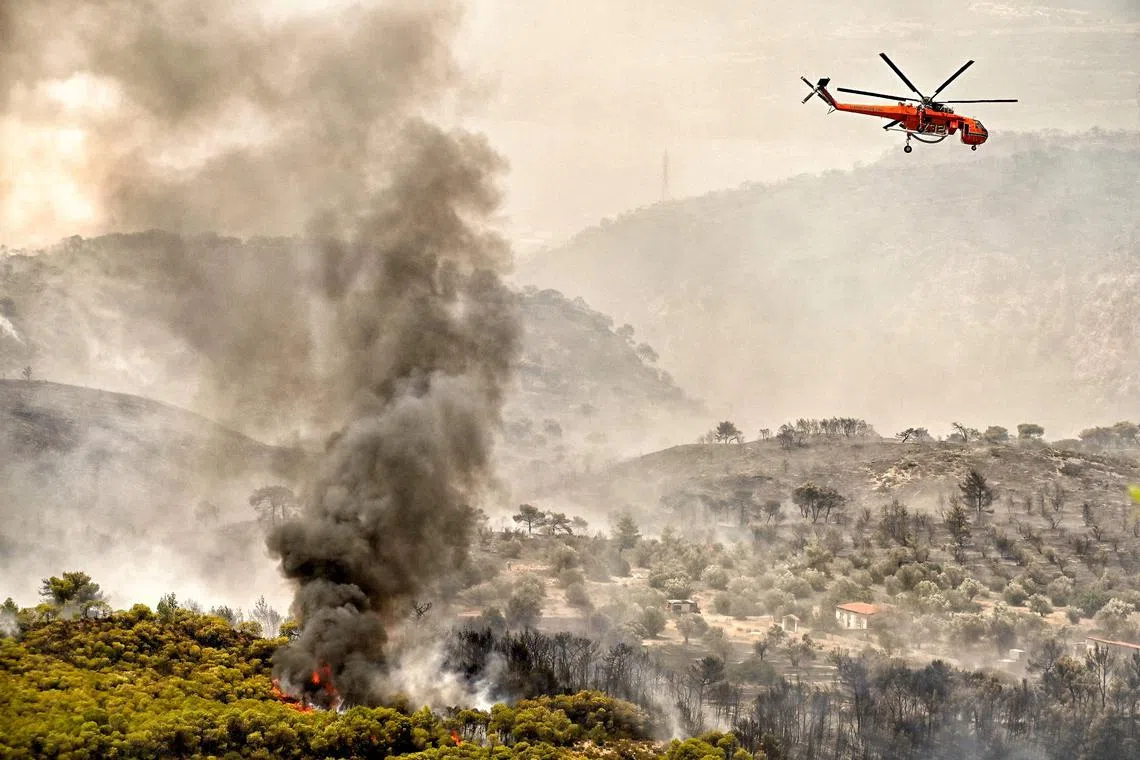Europe’s extreme heat set to intensify as parts of Greece burn
Sign up now: Get ST's newsletters delivered to your inbox

The danger level from wildfires around Athens remains very high amid near-gale force winds.
PHOTO: AFP
ATHENS - Europe’s heat is set to intensify as temperatures are forecast to peak at 47 deg C on Wednesday in the Italian islands of Sicily and Sardinia, while wildfires in Greece continue to rage.
Parts of the Balkans are also under a red heat alert, with Greece and Turkey set to experience higher temperatures, according to the World Meteorological Organisation (WMO).
The latest blast of Saharan heat could test Europe’s record of 48.8 deg C, set in Sicily two years ago, after records were broken in Rome and Catalonia on Tuesday.
The danger level from wildfires around Athens
As United States climate envoy John Kerry met China’s Vice-President Han Zheng on his final day of talks in Beijing,
Following the hottest ever June, temperature records are being broken from Tokyo and Phoenix to Turpan in China, underscoring the threat posed by fossil fuels to a changing climate.
Almost 100 firemen, supported by three jets, are trying to extinguish the Rhodes fire, which is not threatening homes after starting late on Tuesday evening.
Winds across the Aegean islands and the Attica region around Athens will be as strong as 51kmh to 61kmh on Wednesday, before another blast of Saharan heat hits the country tomorrow.
Firefighters have contained some of the blazes around the Greek capital, but the fires are still burning in the region near Loutraki, a resort 80km west of Athens. The national highway to the town is open again, while the Motor Oil Hellas refinery that is in the area is no longer under threat.
Another blaze that spread from Dervenoxoria to Mandra over the past two days is still burning north of Athens, with five fire jets and eight helicopters trying to control it.
The WMO said that soaring minimum night time temperatures – with parts of Sardinia not dropping below 34 deg C – are putting lives at risk, increasing the chance of heart attacks as the body is unable to recover from the daytime heat.
“The minimum temperature is more important for health and failing critical infrastructure during extreme heatwaves,” said senior WMO extreme heat adviser John Nairn.
The intense heat is affecting sea temperatures too, with parts of the Mediterranean expected to reach over 30 deg C, according to the WMO.
Those marine heatwaves could impact the migration of species and cause invasive species to arrive into European waters, with consequences for fisheries and local fauna.
In contrast, northern Europe will continue to see cooler weather over the next 10 days.
Temperatures in Britain and Nordic countries will stay below seasonal averages, with Oslo over 5 deg C below the norm on Sunday, according to forecaster Maxar Technologies. BLOOMBERG


